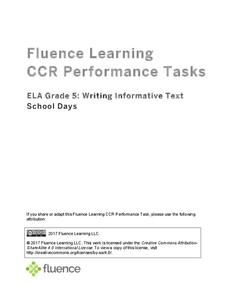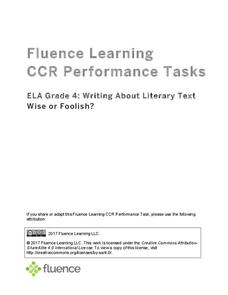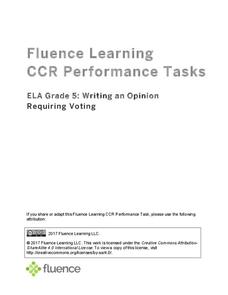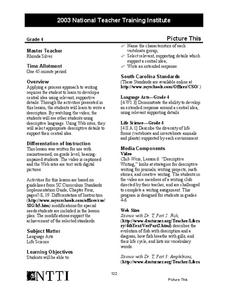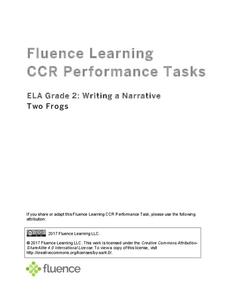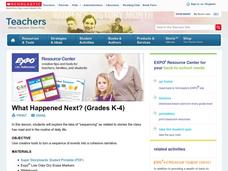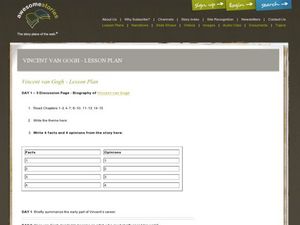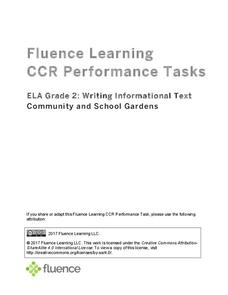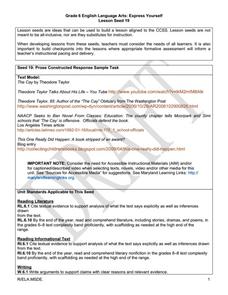Fabius-Pompey School District
Paired Passage Practice and the Extended Response Question
How do pupils relate paired passages to each other? Here's a resource that helps! The lesson includes a short story and a poem as a set of paired reading passages, followed by some analysis questions. It also includes an essay template...
abcteach
How to Write a Four Star Extended Response
Teach pupils how to write a strong extended response with this handout. Learners can follow the instructions to write their responses and keep this page with them for reference. There are examples included. This might be a useful...
Fluence Learning
Writing Informative Text: School Days
A three-part writing assessment challenges scholars to think critically about schools of the past and present. Learners read informative texts, answer questions to prepare for a discussion, research in small groups, complete a Venn...
Fluence Learning
Writing About Literary Text: Wise or Foolish?
A three-part assessment promotes reading comprehension skills. Class members read literary texts and take notes to discuss their findings, answer comprehension questions, write summaries, and complete charts.
Fluence Learning
Writing an Opinion Requiring Voting
Challenge writers to compose an essay detailing their stance on, and the history of, voting. Three assignments, each broken down into three parts, requires fifth graders to take notes, read and complete charts, write paragraphs, compare...
Curated OER
Write a Description
Finding the central idea is the focus of this lesson. Middle schoolers write descriptions of different animals using details and descriptive language. They watch a video of kids using descriptive language, and then use showing language...
Fluence Learning
Writing a Narrative: Two Frogs
Three options offer young writers the opportunity to read a short story, answer questions, and write a response. A handy language arts resource focuses on reading comprehension and analyziing the story's lesson: look before you leap.
Fluence Learning
Writing a Narrative: How Bear Lost His Tail
After reading the first, second, and third parts of "How Bear Lost His Tail", third grade writers answer questions about the story by completing a series of options, including discussion points. Then, they begin to plan a new narrative...
Portland Public Schools
Narrative Writing: Personal Narrative
Whether you need to supplement your narrative writing unit or you'd like to start from scratch, a thorough unit plan can be a helpful way to guide learners through personal narratives. The plan has complete learning goals and...
Polk Bros Foundation
Answer the BIG Question with Cited Examples and Evidence
Close up your unit of study with an examination of one of the guiding or essential questions as it relates to what your class has studied and other research. Class members first write down the question. Then they note down information...
Read4Health
Piggybook: A Read4Health Lesson Plan
"You are pigs." With those three simple words, the lives of the Piggott family were changed forever. Read aloud the children's story Piggybook by Anthony Browne and teach your class the importance of personal responsibility, learning...
Scholastic
What Happened Next? (Grades K-4)
Explore the structure of narrative writing with this fun, collaborative lesson. Start by reading aloud a short story, asking small groups of learners to fill in key events on a large story board prepared on the class whiteboard....
Building Evidence-Based Arguments: Grade 9
New ReviewHigh schoolers investigate the dilemma of a proportional response with a lesson about the history of terrorism and militant extremists in the United States. As they examine memos from the FBI and speeches from President Bush and Obama,...
Prestwick House
The Sign of the Beaver Student Response Journal
Discuss the themes and events of Elizabeth George Speare's The Sign of the Beaver with a collection of journal topics. Each chapter contains two or three questions for kids to consider and write about, for a total of 24 questions.
Smithsonian Institution
Students’ Response to 9/11—A Documentary Report
Young historians research the devastating attacks of 9/11 and use that information to script their own documentaries. The follow-up activity includes recording the documentary and conducting classmate interviews,
Curated OER
Making Magical Creatures Talk
Invite your young writers to take the reins with writing dialogue. Using two characters of their own creation, kids work with partners and then individually to write short conversations.
K12 Reader
What Is a Simile?
As fun as a barrel of monkeys, this figurative language worksheet will engage your students in learning to write similes. Asking them to first think of adjectives describing the six nouns listed on the page, this exercise has young...
Curated OER
Awesome Stories: Vincent van Gogh
Who was Vincent van Gogh? Most of the questions can be answered in two or three sentences; however, there is at least one essay prompt and one personal response question that require longer answers. Questions call for a good mix of...
Fluence Learning
Writing Informational Text: Community and School Gardens
Two informational texts feature community gardens of the past and present and how seeds grow. Scholars read, discuss what they have read, complete a timeline, define words, and compose a brief essay about the texts' main idea.
Curated OER
Doyle Online Writing Lab: Paper Editing Worksheet
Both the writer and the reviewer contribute to this editing worksheet. Before handing the paper to a partner, the writer lists specific areas of concern for the reader to address. The editor addresses these concerns and offers detailed...
Curated OER
So Much Depends Upon...Sixteen-Word Imagery Poems Inspired by Love that Dog by Sharon Creech
After reading Love That Dog by Sharon Creech (and possibly shedding a few tears), middle schoolers work on their own sixteen-word poems with a Six Trait writing activity. They focus on word choice in this activity to capture an...
Curated OER
Hiroshima: Question Answer Response Strategy (QAR)
“The crux of the matter is whether total war in its present form is justifiable. . .” After reading “The Aftermath,” the final chapter of Hiroshima, class members use a Question Answer Response (QAR) strategy to reflect on issues raised...
Novelinks
Touching Spirit Bear: Question Answer Response Strategy
What types of questions help readers learn the most? Sixth, seventh, and eighth graders learn how to ask four types of questions from the Question Answer Response (QAR) reading strategy to help grow their comprehension of Touching Spirit...
Curated OER
Express Yourself Lesson Seed 19: Synthesis
Wrap up your unit on The Cay with an engaging argumentative writing assignment. Writers must decide if they believe The Cay should be banned. The resource includes links to several articles, which have been addressed and examined in...




